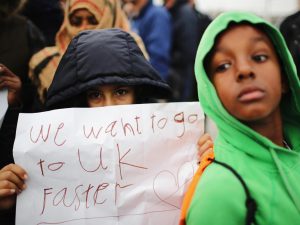 In an exclusive today, The Independent has learned that the Government has made a U-turn on one of its most controversial school policies. Previously, pupils would be required to provide information about their place of birth. It was a policy that would have targeted children as young as two years old – and it is only in the case of these toddlers on which the Government has now backed down.
In an exclusive today, The Independent has learned that the Government has made a U-turn on one of its most controversial school policies. Previously, pupils would be required to provide information about their place of birth. It was a policy that would have targeted children as young as two years old – and it is only in the case of these toddlers on which the Government has now backed down.
As a black man, uncle and former police detective who has witnessed first-hand the daily reality of racial profiling and the detrimental impact it has on people of colour, I’m astonished that this policy was even introduced in the first place. I cannot objectively see how encouraging suspicion towards non-white children in our school system is of any real benefit to Britain, or in any way conducive to integration and improved relations between community groups. I’m a gay man who was schooled through the Conservatives’ Section 28 policy, which prohibited the teaching of homosexuality as “normal” in schools, and this still affects people such as me today. It feels as though we have been seeing the launch of the racial equivalent in the past few years – and exempting two-year-olds certainly doesn’t go far enough.
A school is a place of learning, not a place where teachers demand copies of pupils’ passports and ask parents to confirm if their children are asylum-seekers or refugees. That is the job of immigration officers. The collection of data that includes pupils’ nationalities and countries of birth goes against everything Britain purports to stand for: fairness, equality, innocence until proven guilt and, above all, tolerance.
What happened to the Prime Minister’s promise that she made upon taking office – the one that assured us Britain was a country that was going to work for everyone, fighting injustices, because she knew it still stood in Britain that “if you’re black, you’re treated more harshly than if you’re white”?
The Government says its proposed change was driven by a “dearth of information” about how effective the education sector was for foreign nationals, but I don’t buy that. It’s just another way of keeping an eye on black and brown people. The Department for Education says this new policy is not compulsory or a legal duty, and then goes on to blame teachers for the confusion. But it remains unclear: what happens to a parent who refuses to provide the data? What happens to a school that refuses?
At a time when Britain is attempting to project a fair and tolerant image of itself globally with its supposed commitment to taking child refugees from the Calais Jungle, this feels particularly backward. It is almost as if Theresa May has made the grand gesture, only to rescind it as soon as migrant or refugee children make it to our shores.
There are genuine deportation concerns in some communities. In September, protesters demonstrated outside the Jamaican High Commission in London after more than 50 people – many who had lived in the UK all their lives – were deported to Jamaica. And for those who look like me, there are real fears about being non-white in post-Brexit Britain. The Government is upping the ante on people’s anxiety and feelings of isolation.
Theresa May said in Downing Street: “When we pass new laws, we’ll listen not to the mighty but to you.” Well, she didn’t listen to the people about this one – at least not to the people who the policy was clearly intended to watch and weed out. In fact, it took the House of Lords to object. They say the census “has all the hallmarks of racism”, and it does. The Government’s U-turn on a birth data census for two-year-olds is not good enough. Ending it for everyone would be.
Published by The Independent on 17 November 2016.